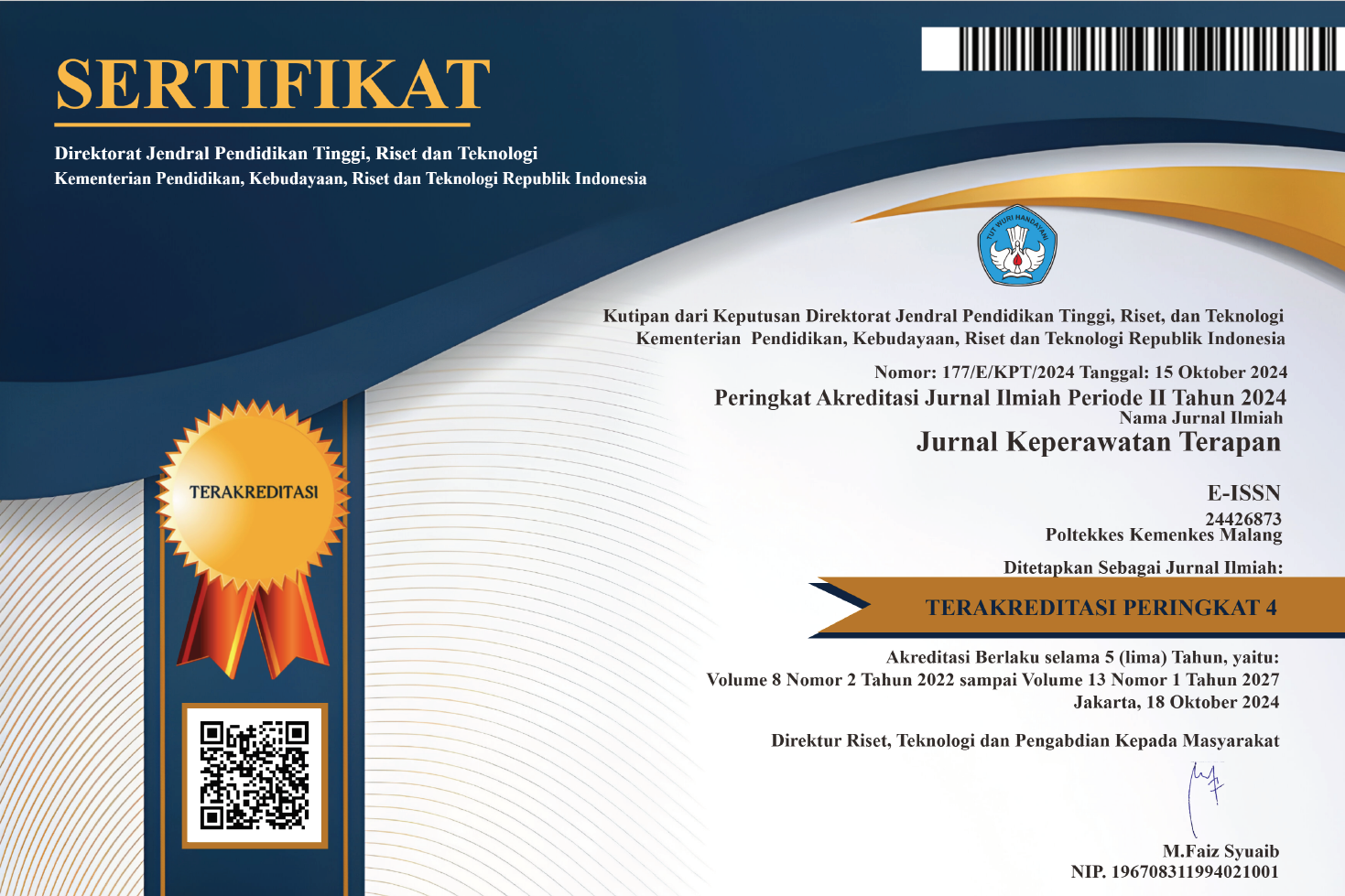THE EFFECT OF BED TEMPERATURES ON THE BODY OF SPEED RECOVERY FUNCTION ON POST SURGERY
DOI:
https://doi.org/10.31290/jkt.v5i1.913Keywords:
bed temperature, speed of recovery of body functionsAbstract
Basically treatment is preoperative patient care, intra and postoperative surgical cases. In postoperative care there is currently a technical problem that remains unanswered, namely heating the bed postoperatively. Implementation of early mobilization, effective coughing, relaxation still requires effective participation of nurses and patients are sometimes ignored because it is too time consuming and nurses. Heating the bed according to the researchers seems to be the solution above. The purpose of this study was to determine the effect of bed temperature on the speed of recovery of body function (peristaltic / platinum movement) using quasi experimental research methods to approach post control design, with a sample of 15 groups of 15 control treatment groups, sampling with simple random sampling technique, research done in the Inpatient Room of Bogenvil Ngudi Waluyo Wlingi Hospital. The results obtained by the t test, t is 3.24 are greater than t table. In conclusion there is a significant effect of bed temperature on postoperative speed of body function (peristaltic / platelet movement) recovery. This evidence should be an encouragement to manage the implementation of surgical care for habits.
References
Arikunto, S. 2002. Prosedur Penelitian, Suatu Prosedur Praktek. Jakarta: PT Rineka Cipta
Bare BG., Smeltzer SC. 2001. Buku Ajar Keperawatan Medikal Bedah. Jakarta: EGC
Corwin. 2002. Patofisiologi Penyakit. Jakarta: EGC
Corwin, E. 2005. Buku Saku Patofisiologi. Jakarta: EGC
Depkes RI.2012. Profil Kesehatan Republik Indonesia Tahun 2012.(Online). Media: http://www.depkes.go.id. 13 November 2013
Dewanto G., 2009. Diagnosis dan Tatalaksana Penyakit Saraf. Jakarta: Buku Kedokteran EGC
Joesoef, AA, Kusumawati, K. 2002. Tinjauan Umum Tentang Vertigo. Surabaya: Universitas Airlangga Press
Marchiori, L, L., Melo, JJ, P ossette, FL, dan Correa, AL, 2010, Perbandingan Frekuensi Vertigo pada Lansia dengan dan tanpa Hipertensi Arteri, Intl. Lengkungan. Otorhinolaryngol, 14 (4), 456-460.
Mudzakir, N. 2009. Ketentuan Statistika Modern untuk Ilmu Sosial. Jakarta: Salemba Humanika.
Notoatmodjo, S. 2010. Metodologi Penelitian Kesehatan. Ed. Revisi Cetakan Kedua. Jakarta: PT Rineka Cipta.
Putranta. 2005. Panduan Praktis Diagnosis & Tatalaksana Penyakit Saraf. Jakarta: EGC.
Sastroasmoro, S & Ismail, S, (1995). Dasar-Dasar Metodologi Penelitian Klinik, Binarupa Aksara, Jakarta.
Setiadi. 2013. Konsep Dan Praktik Penulisan Riset Keperawatan. Ed. 2. Yogyakarta: Graha Ilmu.
Sugiyono. 2010. Statistika Untuk Penelitian. Bandung: Alfabeta
Sudigdo & Sofyan. 2011. Dasar - Dasar Metedeologi Penelitian Klinis. Jakarta: Sagung Seto
Sumitelyah, E., 2010. Jurnal Penelitian Pengaruh Senam Vertigo Terhadap Keseimbangan Tubuh pada Pasien Vertigo di RS Siti Khodijah Sepanjang. RS Siti Khodijah Sepanjang: Jawa Timur.
Wilhelmsen Kjersti et al. 2008. Properti Psikometrik Skala Gejala Vertigo - Bentuk Pendek. Gangguan Telinga, Hidung, dan Tenggorokan BMC. 8: 2
Wreksoatmodjo, B, R. 2004. Vertigo: Aspek Neurologi. Bogor: Cermin Dunia Kedokteran












